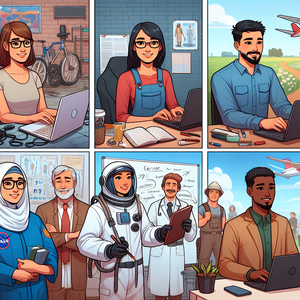The Rise of Tech in the Meat Industry: Career Opportunities at Tyson Foods

Automation has become a cornerstone of modern meat processing, enhancing efficiency and safety. Tyson Foods has invested significantly in robotic systems that perform various tasks, from packaging to quality control. These advancements not only streamline operations but also create new job roles for technicians and engineers who specialize in maintaining and programming these systems. For instance, Tyson Foods has launched initiatives to train employees in robotics, allowing them to evolve alongside the technology and take on more sophisticated roles within the company. This shift towards automation not only increases productivity but also enhances workplace safety by reducing manual labor risks.
Data Analytics for Decision Making
As data becomes a vital asset in evaluating business performance, Tyson Foods has harnessed the power of analytics to drive decision-making. The company employs data analysts who collect and interpret data from various departments, including production and sales, to optimize processes and enhance efficiency. This focus on data-driven strategies has opened up career paths for individuals skilled in statistics, data science, and business intelligence. For example, Tyson’s analytics team has successfully implemented predictive modeling to forecast demand trends, enabling better inventory management and reducing waste. By leveraging data analytics, Tyson Foods can respond more effectively to market demands while ensuring operational efficiency.
Food Safety Technology Innovations
Ensuring the safety of food products is paramount in the meat industry. Tyson Foods is leveraging technology to enhance its food safety protocols. This includes the use of advanced sensors and monitoring systems that track the safety and quality of products throughout the supply chain. Careers in food safety technology are growing, with roles such as food safety specialists and compliance officers becoming increasingly important. These positions require a deep understanding of food safety regulations and the ability to utilize technology to ensure compliance and quality assurance. Tyson's commitment to food safety not only protects consumers but also fosters a culture of accountability and excellence within the organization.
Sustainability Through Technology
Tyson Foods is also committed to sustainability, and technology plays a crucial role in achieving its environmental goals. The company is exploring innovations such as precision agriculture and waste reduction technologies. This shift towards sustainability opens up new career paths in environmental engineering and sustainable practices. Employees engaging in these initiatives can work on projects aimed at minimizing the environmental impact of meat production, thus contributing to a greener future. Tyson's sustainability efforts reflect a growing trend in the industry, where companies are increasingly held accountable for their environmental footprint.
Professional Development and Continuous Learning
With the rapid pace of technological change, Tyson Foods emphasizes continuous learning and professional development. The company offers training programs and partnerships with educational institutions to upskill employees in emerging technologies. This investment in employee growth not only enhances individual career prospects but also ensures that Tyson remains competitive in the evolving landscape of the meat industry. By fostering a culture of continuous learning, Tyson Foods empowers its workforce to adapt and thrive in an environment that is constantly changing.
The integration of technology into the meat industry by Tyson Foods is not just about improving efficiency; it is about creating a new paradigm of career opportunities. From automation and data analytics to food safety and sustainability, the roles emerging within Tyson Foods are diverse and impactful. For individuals passionate about technology and looking to make their mark in a dynamic field, Tyson Foods offers a wealth of opportunities to contribute to the future of food production. As the meat industry continues to evolve, those who embrace these changes will find fulfilling and innovative career paths ahead. The rise of tech in the meat industry not only heralds a new era of productivity and safety but also opens doors for a new generation of professionals eager to shape the future of food.
Robotics Technician
Tyson Foods, JBS, Hormel Foods
Core Responsibilities
Maintain and troubleshoot robotic systems used in meat processing and packaging.
Collaborate with engineering teams to enhance robotic functionality and efficiency.
Train staff on the operation and maintenance of robotic equipment.
Required Skills
Proficiency in programming and operating robotic systems (e.g., FANUC, ABB).
Strong understanding of automation principles and safety standards.
Experience with mechanical and electrical systems in industrial environments.
Data Analyst – Supply Chain Optimization
Tyson Foods, Cargill, Pilgrim's Pride
Core Responsibilities
Analyze production and sales data to identify trends and opportunities for efficiency improvements.
Develop predictive models to forecast inventory needs and reduce waste.
Present data findings to stakeholders to support strategic decision-making.
Required Skills
Expertise in data visualization tools (e.g., Tableau, Power BI) and statistical software (e.g., R, Python).
Strong analytical skills with experience in supply chain management.
Ability to communicate complex data insights clearly to non-technical audiences.
Food Safety Compliance Officer
Tyson Foods, Smithfield Foods, Perdue Farms
Core Responsibilities
Ensure compliance with food safety regulations and company policies throughout the meat production process.
Conduct regular audits and inspections to monitor product safety and quality.
Collaborate with technology teams to implement advanced monitoring systems for food safety.
Required Skills
In-depth knowledge of FDA and USDA food safety regulations.
Experience with quality assurance practices and risk management in food production.
Strong analytical skills and attention to detail in identifying potential safety issues.
Environmental Engineer – Sustainable Practices
Tyson Foods, Cargill, Nestlé
Core Responsibilities
Design and implement projects aimed at reducing the environmental impact of meat production.
Evaluate and optimize waste management and resource conservation initiatives.
Collaborate with cross-functional teams to integrate sustainability into operational practices.
Required Skills
Degree in Environmental Engineering or a related field with experience in sustainability projects.
Knowledge of environmental regulations and assessment methodologies.
Strong project management skills and the ability to work with diverse teams.
Learning and Development Specialist – Emerging Technologies
Tyson Foods, Kraft Heinz, General Mills
Core Responsibilities
Develop and facilitate training programs focused on new technologies in the meat industry.
Assess employee training needs and create tailored learning experiences.
Monitor and evaluate the effectiveness of training initiatives to ensure employee growth.
Required Skills
Experience in instructional design and training program development.
Strong understanding of emerging technologies in food production and processing.
Excellent communication and interpersonal skills for engaging diverse audiences.


